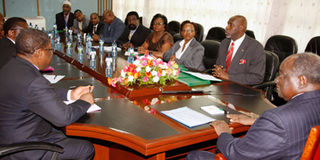Premium
AG faults suit on law team salaries

Photo/FILE
President Kibaki meets with members of the Commission on the Implementation of the New Constitution at Harambee House office, Nairobi March 30, 2011. According to the State counsel, there was no agreement pertaining to salaries when the interviewing panel picked the commissioners.
The Attorney-General has dismissed as lacking in merit a petition seeking to have members of a commission paid.
He was responding to a suit by an advocate seeking an order compelling the Public Service Commission, Finance minister and AG to pay salaries for members of the Constitution Implementation Commission. (READ: Commissions to cost taxpayers Sh3 billion in salaries)
Mr Kerosi Ondieki, a Kisii-based lawyer also wants the members compensated for the alleged delay in payment of their salaries.
But through State counsel Kepha Onyiso, the AG told a three-judge bench that matters of remuneration were guided by a public policy set out by the Executive.
Criteria for payment
“In matters of remuneration, there is a policy which sets out the criteria for payment.
“The main stumbling block is failure by the CIC and the PSC to reach a consensus, which if done will enable everything to fall in place,” said Mr Onyiso.
He said the issue of salaries was subject to the law of contract, which is being negotiated by the commissioners and the PSC.
The State counsel argued that there was no agreement pertaining to salaries when the interviewing panel picked the commissioners.
“In an offer, you have the liberty to accept or reject what is on the table. The commissioners rejected what was offered and the dispute is being handled in another forum.”
Mr Onyiso said that the conflict was between the government policy on remuneration and the market rates which if implemented would negatively affect the public interest that ought to be safeguarded.
He dismissed the petition as mere speculation, saying that nothing had been presented to show that the commissioners were not being paid.
However, Mr Ondieki says in the suit that failure to pay the commissioners was not only unconstitutional but also an impediment to its implementation.
“Failing to pay the remuneration would be to frustrate the commissioners from discharging their duties and consequently defeat the enactment of laws necessary for the implementation of the Constitution,” he said.
He maintained that by failing to file papers in court showing that they had been paying the commissioners, the respondents were acting in total disregard of the law.
The lawyer argued that the court had the power under Article 3 of the Constitution to ensure all persons respect, uphold and defend the Constitution.
Mr Ondieki filed the petition last month after the commissioners, led by chairman Charles Nyachae publicly accused the government of failing to pay them.
They had allegedly not been paid for seven months.
Deliver ruling
Justices Mary Ang’awa, George Dulu, and Wanjiru Karanja will deliver their ruling on October 4.
In July, the salary dispute erupted after the government declared it would not pay “exorbitant” salaries demanded by the commissioners. (READ: Row erupts over ‘exorbitant’ CIC salaries)
This followed revelations by five CIC members led by vice-chairperson Elizabeth Muli that they had not been paid for seven months, blaming this on a directive by Head of Public Service Francis Muthaura to the Treasury not to process their salaries.
The government argued that the salaries demanded were not only above normal rates for other State officers, but also un-sustainable.
The commission had demanded a Sh1.3 million monthly salary for Mr Nyachae, Sh1.17 million for Ms Muli and Sh1.14 million per month for each of the other seven commissioners.




